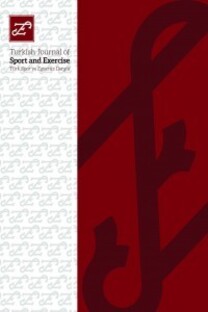The effect of game on pre-school period (ages 3-6): a review of study
The effect of game on pre-school period (ages 3-6): a review of study
___
- 1. Acarlar F. Sembolik Oyunun Dil Gelişimi ve Dil Bozukluklarıyla İlişkisi, Özel Eğitim Dergisi, 3(1), 25-33, Ankara, 2001.
- 2. Akandere M. Eğitici Okul Oyunları, Nobel Yayıncılık, 1. Baskı, Ankara, 2003.
- 3. Akandere M. Eğitici Okul Oyunları, Nobel Yayıncılık, 3. Baskı, Ankara, 2006.
- 4. Al-Balhan E. Training Kuwaiti kindergarten professionals in knowledge of child development, facilitation, strategies and developmental analysis through the transdisciplinary playbased assessment techniques, University of Denver, Doctor Of Philosophy UMI, USA, 1998.
- 5. Arnold A. Çocuğunuz ve Oyun (Çev. Gümüş, A), Oğul Matbaacılık, İstanbul, 1995.
- 6. Aslan F. Identification of the features of childs games and toys, aged between 1-3, through the development theory. Journal of Cumhuriyet University School of Nursing, 2000; 4(2): 40-43.
- 7. Baykoç Dönmez N. Üniversite Çocuk Gelişimi ve Eğitimi Bölümü ve Kız Meslek Lisesi Öğrencileri İçin Oyun Kitabı, 1. Basım, İstanbul: Esin Yayınevi, 2000.
- 8. Bernd A. The effects of play on problem solving, Doctoral Thesis, Long Island University, UMI, USA, 1996.
- 9. Brown R. A First Language: The Early Stages, Harvard University Press, Cambridge, MA. 1973.
- 10. Byers MR. A physical education activities instructional manual for Pk-3 grades for elementary education and physical education majors. Master Thesis, Central Missouri State University, UMI, USA, 1997.
- 11. Casby MW, Della CM. Symbolic play performance and early language development. Journal of Psycholinguistic Rescarh, 1987; 16(1): 31-42.
- 12. Çelebi B. Hareket Eğitiminin Okul Öncesi Eğitim Kurumlarındaki 5-6 Yaş Grubu Çocuklarda Fiziksel ve Motor Gelişime Etkisi, Institute of Social Sciences, 2010.
- 13. Falcone G. The Impact of a Developmental Guidance Program on Five Fourth Grade Students in a Suburban School District: Clinical Case Study, Widener University, Doctor of Education, USA, 1999.
- 14. Gander JM, Gardiner WH. Çocuk ve Ergen Gelişimi, 7. Baskı, Çeviri: Ali Dönmez, H. Nermin Çelen, Bekir Onur, Ankara: İmge Kitabevi Yayınları, 2010.
- 15. Güneş A. Okullarda Beden Eğitimi ve Oyun Öğretimi, 4. Baskı, Ankara: Pegem A Yayıncılık, 2004. 16. Günsel AM. Okul Öncesinde Beden Eğitimi ve Uygulamaları, Ankara: Anı Yayıncılık, 2004.
- 17. Hazar M. Beden Eğitimi ve Sporda Oyunla Eğitim, Tutibay Yayıncılık, Ankara 2000.
- 18. Kerkez F. Oyun ve egzersizin yuva ve anaokuluna giden 5-6 yaş grubu çocuklarda fiziksel ve motor gelişime etkisinin araştırılması. Doctoral Thesis, Institute of Social Sciences, Karadeniz Technical University, Trabzon, 2006.
- 19. Kuru O. Dokuz yaş çocuklarin psikomotor gelişimlerinde oyunun etkisi. Master Thesis, Institute of Social Sciences, Fırat University, Elazığ, 2009.
- 20. Küçükkaya El. Okulöncesi 5-6 Yaş Kız ve Erkek Çocukların Motor Gelişimlerinin Sağlanmasında Oyunun Yeri ve Önemi, Uludağ Üniversitesi, II. Ulusal Beden Eğitimi ve Spor Öğretmenliği Sempozyumu, Bursa, 2001.
- 21. Lindsay PL. The physical characteristic of playground games in public elementary schools in Edmonton. Canadian Association for Health, Physical Education and Recreation Journal, 1984; 50: 8-11.
- 22. Lorenzi DG. Comparison of activity levels during free play of elementary school aged children with and without mental retardation. Master of Arts, University of Pennsylvania, USA, 1998.
- 23. Mengütay S. Çocuklarda Hareket Gelişimi ve Spor. İstanbul: Morpa Kültür Yayınları, İstanbul, 2005.
- 24. Muratlı S. Antrenman Bilimi Işığı Altında Çocuk ve Spor. Ankara: Bagırgan Yayımevi, 1997.
- 25. Öğretir AD. Play and the play therapy. The Journal of The Industriel Arts Education Faculty of Gazi University, 2008; (22): 94-100.
- 26. Özdoğan, B. Çocuk ve Oyun, Çocuğa Oyunla Yardım. Genişletilmiş 5. Baskı, Ankara: Anı Yayıncılık, 2009.
- 27. Patrick T. Play: An Important Component of Preventative Behavior Management, Arkansas: Archild Inc., 1996.
- 28. Poyraz H. Okul Öncesi Dönemde Oyun ve Oyuncak. Ankara: Anı Yayıncılık, 2003.
- 29. Sevinç M. Erken Çocukluk Gelişimi ve Eğitiminde Oyun. İstanbul: Morpa Kültür Yayınları Ltd. Ş., 2004.
- 30. Sevinç M. Erken Çocuklukta Gelişim ve Eğitimde Yeni Yaklaşımlar. 1. Basım, 2. Cilt, İstanbul: Morpa Kültür Yayınları, 2005.
- 31. Seyrek H, Sun M. Okul Öncesi Eğitiminde Oyun. 5. Baskı, İzmir, 1999.
- 32. Tyson DA. The effects of intervention activities on motor skills in kindergarten students. Doctoral Thesis, Texas Avem University, USA, 1998.
- 33. Vandalen DB, Bennett B. A World History of Physical Education Cultural Philosophical Comparative, Prentice Hall Inc., Second Edition, Englewood Cliffs, N.J., 1971.
- 34. Yalçın H. Çocuk Gelişimi. 1. Basım, Ankara: Nobel Yayın Dağıtım Tic. Ltd. Şti., 2010.
- 35. Yavuzer H. Çocuk Eğitimi El Kitabı. 27. Basım, İstanbul: Remzi Kitabevi, 2011.
- 36. Zachopoulou E, Aggeliki T, Vassiliki D. The effects of a developmentally appropriate music and movement program on motor performance. Early Childhood Research Quarterly, 2004; 19: 631642.
- Yayın Aralığı: 3
- Başlangıç: 1999
- Yayıncı: Selçuk Üniversitesi, Spor Bilimleri Fakültesi
The effect of game on pre-school period (ages 3-6): a review of study
Cengiz TASKIN, Mine TASKIN, Faruk GUVEN
Relationship between balance and aerobic capacity in adolescent athletes
Cengiz TASKIN, Mine TASKIN, Faruk GUVEN
Examination of flexibility and sprint performance values of adolescent footballers
Bekir MENTES, Tuncay ERCIN, Kenan UZUN
Esmaeil ZAHIBI, Seyed Hossein ALAVI
The comparison of physical fitness in secondary male students in altitude and coastal areas
